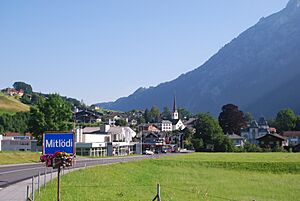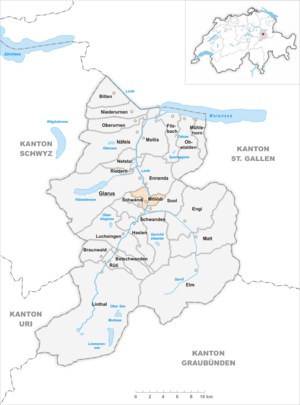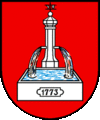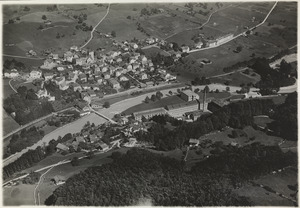Mitlödi facts for kids
Quick facts for kids
Mitlödi
|
||
|---|---|---|
|
Village (and former municipality)
|
||
 |
||
|
||

The former municipal area (2007)
|
||
| Country | Switzerland | |
| Canton | Glarus | |
| Municipality | Glarus Süd | |
| Area | ||
| • Total | 6.25 km2 (2.41 sq mi) | |
| Elevation | 504 m (1,654 ft) | |
| Population
(December 2020)
|
||
| • Total | 1,000 | |
| • Density | 160/km2 (410/sq mi) | |
Mitlödi is a charming village located in Switzerland. It used to be its own municipality, but now it's part of a larger area called Glarus Süd, in the canton of Glarus.
Contents
A Look Back: Mitlödi's History
Mitlödi has a long history! It was first mentioned way back in 1320, under the name Mitlodi.
The village has its own special symbol, called a coat of arms. This symbol was officially chosen in 1939. It shows a silver fountain, known as the "Schäflibrunnen." This fountain is a real landmark in Mitlödi, standing right in front of the church since 1773.
In 1879, a big change happened: Mitlödi got its first train connection! This made it much easier for people to travel and for goods to move in and out of the village.
More recently, on January 1, 2011, Mitlödi joined with other villages to become part of the bigger municipality of Glarus Süd.
Where is Mitlödi?
Mitlödi is nestled in the valley of the Linth river. It sits on a very old rock slide, about 504 meters (1,654 feet) above sea level.
The village has two main parts: Mitlödi itself, and a separate area called Ennetlinth. Ennetlinth is located on the other side of the Linth river.
If you travel south from Mitlödi, you'll find the village of Schwanden. If you go north, you'll reach the town of Glarus.
The area that used to be Mitlödi's municipality covers about 6.2 square kilometers (2.4 square miles). A big part of this land, about 56%, is covered by forests. About 32% is used for farming. The rest of the land includes buildings, roads, rivers, and mountains.
Getting Around: Transport in Mitlödi
Mitlödi is located on the main road, Hauptstrasse 17. This road goes through the entire canton of Glarus. It then climbs up the Klausen Pass into another canton called Uri.
There's also a railway line, the Weesen to Linthal railway line, that runs next to the main road and the Linth river.
The Klausen Pass is a high mountain pass, and it's usually only open from June to September. For the rest of the year, the road and railway up the Linth valley are the only ways to get to Mitlödi.
Train Services
Mitlödi railway station is a stop for two important train services:
- The Zürich S-Bahn service S25 travels between Linthal and Zürich.
- The St. Gallen S-Bahn service S6 connects Rapperswil and Schwanden.
As of December 2023, both services run once every hour. This means that between Ziegelbrücke and Schwanden, you can usually catch a train about twice an hour.
People of Mitlödi: Demographics
Mitlödi has a population of 1,000 people. As of 2007, about 22.5% of the people living in Mitlödi were from other countries. Over the last 10 years, the population has slightly decreased.
Most people in Mitlödi (about 84%) speak German. Italian is the second most common language (5.4%), followed by Spanish (4.9%).
Education and Work
People in Switzerland generally have good education. In Mitlödi, about 63.7% of adults (aged 25–64) have finished high school or gone on to higher education, like university or a special college called a Fachhochschule.
Mitlödi has a low unemployment rate of 1.7%. This means most people who want to work can find jobs.
As of 2005, here's how people worked in Mitlödi:
- About 31 people worked in the primary economic sector, which includes farming and forestry. There were about 15 businesses in this area.
- About 398 people worked in the secondary sector, which includes manufacturing and construction. There were 21 businesses in this area.
- About 144 people worked in the tertiary sector, which includes services like shops, hotels, and offices. There were 41 businesses in this area.
Population Changes Over Time
Here's a look at how Mitlödi's population has changed through the years:
| year | population |
|---|---|
| 1777 | 183 (adult males) |
| 1850 | 649 |
| 1900 | 736 |
| 1950 | 821 |
| 2000 | 1,030 |
| 2020 | 1,033 |
See also
 In Spanish: Mitlödi para niños
In Spanish: Mitlödi para niños
 | Frances Mary Albrier |
 | Whitney Young |
 | Muhammad Ali |



